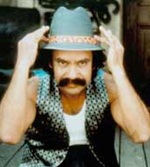I took some film-studies classes at Portland State University in 2005 and 2006, my first academic experience since graduating from Brigham Young University in 1999. PSU and BYU are very different from one another, obviously. At BYU, you can be expelled for smoking marijuana. At PSU, the school mascot is Cheech.
Another significant difference is that every PSU professor I had was liberal, compared to the conservative instructors I had at BYU. Some people at BYU talk about certain professors there being liberal, but the BYU version of “liberal” really just means having a mustache.
The most hyper-liberal, super-P.C. professor of my life was the instructor of a Portland State class I took called “Writing About Film.” We’ll call her Jackie. She was about 50 years old, married with children, always impeccably dressed and coifed. And to her, no matter what a movie was about, it was REALLY about women’s issues. It always came back to that with her. “Rashomon”? Women’s issues. “Casablanca”? Women’s issues. “Happy Gilmore”? You better believe that’s about women’s issues.

For a class called “Writing About Film,” we did very little writing about film, or about anything else. Mostly we just talked about film. Actually, mostly we just talked — or, more exactly, mostly we just listened to Jackie talk, occasionally about writing, occasionally about film (though rarely the film we were supposed to be talking about), but mostly about other subjects altogether. The syllabus proved to be a fanciful, unreliable document bearing little resemblance to what we were actually doing in class every day. Considering I was taking the class because I was already doing a lot of writing about film and was hoping to learn some techniques or skills that could help me improve, all of this was a disappointment.
Adding to my frustration was the fact that if you ever disagreed with Jackie about something, you were wrong. Oh, she talked a good game. She would SAY that she was open to other viewpoints, and that so much of art was subjective, and so on. But then if you expressed an opinion different from hers, she would explain how your opinion was based on faulty logic, or how you were letting your emotions decide for you, or how you were missing key information that would have shaped your view into something else (i.e., more like hers). So while in theory it was possible to disagree with her and still be valid, in practice this was never known to occur.
There was also Jackie’s habit of jabbering rabidly about matters of political correctness. This often dovetailed with her always-rightness. It made it easy to predict what her opinions would be, so that you’d know what to say to make sure you were “right” (or, what to say to make sure she’d argue with you, if that’s the kind of person you were). Whatever the most P.C. point of view was, that was sure to be Jackie’s.
One time she mentioned Spike Lee for one reason or another, and then she asked, “How many of you are Spike Lee fans?” Only a couple of hands went up. She tsk-tsked and said, “Another sign we live in a racist society.”
Now, I thought she was joking. It was a funny thing to say, and I chortled. But I was the only one. She continued on with whatever she was talking about, and I never knew for sure whether she was kidding or whether she really did think that failing to be a Spike Lee fan was indicative of being stuck in a racist society. Did she believe that in a world entirely devoid of racism, Spike Lee would have legions of fans, and that the only reason he’s not as popular as Steven Spielberg now is that The Man is keeping him down? Really? I mean, there are plenty of white filmmakers I’m not a big fan of, too. And don’t even get me started on the Asians!
We students didn’t usually argue very extensively with Jackie. We knew it was pointless. She tended to get worked up and emotionally charged when someone disagreed with her, and she wasn’t always very tactful about expressing her dissension. So we tended to let her say whatever she wanted, and then we’d make fun of her in the hallway after class.
I had only one confrontation with her, and it was over the movie “Thelma & Louise.” This film actually is about women’s issues, of course, so it’s no surprise that we watched it in class, analyzed it, and wrote papers on it. It was the topic of discussion for many days, several days longer than the syllabus (which by this point we had given up on altogether) had said it should be.
In one of our class discussions, I said that a particular scene rang false to me, damaging what was otherwise a pretty solid movie. The scene in question goes like this:
Thelma and Louise, in their cross-country travels, have occasionally passed the same lewd truck driver, who would leer obscenely at them from his truck. Finally, the women flag him down. He gets out of his truck to come talk to them, clearly believing his attempts to woo them — which have all involved wagging his tongue — have succeeded and that he is going to be the meat in a Thelma-and-Louise sandwich. But instead, T&L demand to know why he’s behaving the way he is, how he gets off treating women that way, and so on. He’s confused. They demand an apology. He stubbornly refuses. Then Thelma or Louise (I forget which is which) pulls out a gun, points it at him, and INSISTS that he apologize. He yells, even more belligerently than before, “[SWEAR WORD] YOU!” So Thelma or Louise shoots the tires out on his tanker truck. This makes him yell and swear even more, so the woman who hadn’t already produced a gun pulls one out and they both shoot the truck itself, causing it to explode.
(You can watch the scene here, courtesy of some girl’s MySpace page, but be aware that it has some R-rated language and vulgarity. If you want to hear just the audio, with the swearing bleeped out, listen here.)
I said in class that the truck driver is played in such an exaggerated, cartoonish way that he’s not believable. He’s a one-dimensional villain. Yes, there are sexist men in the world; everything the guy did up until he got out of his truck was realistic. But I think that 90 percent of men, when actually confronted about their lascivious behavior, would get embarrassed or quiet or maybe defensive, not loud and angry the way this guy does. And I think that 100 percent of men, once a gun is pointed at them, would cease their belligerence and do whatever the gun-holder wanted them to do. There’s no way a guy, no matter how sexist and piggish he is, will yell “[SWEAR WORD] YOU!” at someone pointing a gun at him. I said I thought the real objective of the scene was that director Ridley Scott wanted there to be an explosion, so he had the truck driver keep egging the women on even when it no longer made sense for him to do so.

Jackie, however, felt the character was perfectly true to life and that there are many men who would behave in exactly the same way in those circumstances. She then said:
“The reason you don’t want to believe there are men like that is that you’re a man, and subconsciously you feel guilty about the way men have treated women.”
I don’t know about you, but one of my least favorite things in the world is being told what I think. I am the world’s number-one authority on what I, Eric D. Snider, think, and I can assure you, this movie character’s lack of believability has nothing to do with my thoughts about women. It has to do with him yelling like Yosemite Sam even while someone’s threatening to shoot him. Maybe a trained therapist or psychologist could get to the root of why I feel this way. Maybe he or she would discover that I really am ashamed of my gender’s treatment of the fairer sex, and that it has produced a mental block wherein I refuse to acknowledge the realism of movie characters who yell obscenities at women even when their lives are in jeopardy. But that is for a trained mental-health expert to determine, not some feminism-obsessed English professor who would rather pull out her own hair than concede that someone else may have a valid, opposing viewpoint.
So I said:
“Oh, is that how I feel? Thanks for clearing that up for me.”
My mom always said that not everything needs to have a smart-aleck answer, and I believe her. But I think “The reason you don’t want to believe there are men like that is that you’re a man, and subconsciously you feel guilty about the way men have treated women” DOES need to have a smart-aleck answer. Jackie wasn’t listening, though. Once she had dismissed my point of view, there was no reason for her to keep paying attention to me, and the class discussion continued. Then Cheech came in to get us excited about that week’s football game, or maybe I’m just making that up.
I went back and forth for a while in deciding whether to identify the professor. Everything I say here is true, and it happened in public (i.e., in the classroom, not in private conversations), so I'd be justified in telling you her name. But at the same time, it's not like very many regular "Snide Remarks" readers go to PSU and should be warned to avoid her. The only reason I'd be identifying her would be in the perverse hope that she would someday stumble across the column and feel embarrassed. And that didn't seem like a very good reason, so I gave her the not-very-creative pseudonym of Jackie instead. Believe me, her classroom tactics have been well-documented by others on the various "Rate Your Professors" websites, so it's not like the word isn't getting out.
The class was a total bust for me. I missed a week at the beginning of the term for the Sundance Film Festival, and another week at the end -- finals week -- for South By Southwest. I was taking classes for my own edification, so my grades didn't really matter. And since I'd already given up on getting anything out of this particular class, I didn't put forth any effort to make arrangements for when I had to miss the final. Ah, well. At least I got to watch and analyze "Thelma & Louise."




